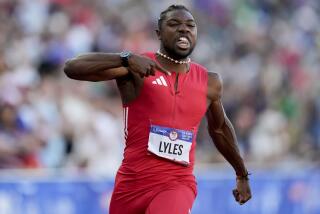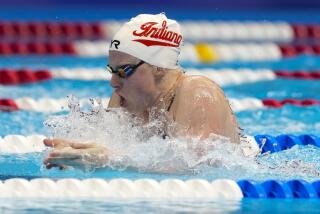Bjorn Zikarsky Looks to Fill a Tall Order : Swimming: German freestyler, who stands 6 feet 10 and trains with the Novaquatics in Irvine, is gearing up for the German Olympic trials next spring.
- Share via
LOS ANGELES — Bjorn Zikarsky wolfed down a second pancake. There was a lot of him to fill.
Stretched out across two full spots at the restaurant counter, he drew a few curious looks from other patrons. They couldn’t help but stare, even a little.
At 6 feet 10, Zikarsky is the tallest competitive swimmer in the world. He stands a shade above his twin brother, Bengt, who is 6-9-and-some-change.
Together, they are the tallest swimming twins around.
“Yeah, people think we’re a novelty,” said Bjorn Zikarsky, a native of Erlanger, Germany. “We get a few jokes about it. People always want to know if we play basketball. I don’t mind. We’ll take all the attention we can get.”
But Zikarsky, a specialist in the 50- and 100-meter freestyles, is more than part of a nifty trivia answer. He is also a talented swimmer, and attention for that might come soon enough.
Zikarsky, who graduated from USC in May, is on a course he hopes will take him to the 1992 Olympics. He will spend the next year shuttling between Germany and Irvine, where he trains with the Novaquatics, a club team.
“Bjorn is a comer,” Novaquatics Coach Dave Salo said. “I think he’s just now starting to realize what he’s capable of accomplishing.”
He knows. Zikarsky already has planned his entire year, with an eye on the German Olympic trials in May.
Zikarsky, 24, will work as a lifeguard this summer in Los Angeles County and will also explore a couple of business opportunities. However, he will also be getting down to business.
He put in extra time in school to graduate in three years with a business degree, so he could have the year off to get ready.
“I plan to train 25 hours per week and I have a list of meets that I intend to swim in,” he said. “I don’t want any distractions. Everything is carefully timed to get ready for the Olympic trials.”
Zikarsky, who began swimming competitively when he was 7, has had to overcome the difficulties of his size.
Although his long body gives him powerful strokes, he has had problems with starts and turns. But under Klaus Rosenkranz, his coach in Germany, he has improved his techniques.
Zikarsky and his brother have been compared at times to Michael Gross, the West German swimmer who was a star at the 1984 Olympics.
Gross, nicknamed the Albatross, is 6-6.
“That’s quite a compliment to be put in that category,” Zikarsky said.
Zikarsky also has had some success on the international level. In 1989, he anchored the West German 400 freestyle relay team, which finished first at the European Championships.
“There were four teams within .09 seconds of each other,” he said. “We were all right there, but I was lucky enough to reach out and touch first. I guess my size was an advantage that day.”
After his career was interrupted by two years of military service, Zikarsky returned to the pool in 1986. Two years later, he qualified for the West German Olympic team and finished fifth in the consolation final of the 100-meter freestyle.
His performance caught the eyes of several college coaches in the United States.
Zikarsky’s brother was already swimming for the University of Minnesota, so he came to visit some of the schools.
“I picked USC because I felt the most comfortable there,” he said. “All the other schools put pressure on me. But the USC coach told me he’d like me to come with them, but I should go wherever I felt was best for me.”
Zikarsky decided to attend USC in fall, 1989. It was there he met Salo, who was an assistant coach for the Trojans until last October.
Salo took over the Novaquatic program in November and brought Zikarsky with him.
“I’m more comfortable with Dave’s training style. It’s more European,” Zikarsky said. “When I came over here I was surprised to find that most of the training was based on yardage. All they did was swim laps. That’s fine, but I was used to working more on technique and that was also Dave’s philosophy.”
Zikarsky finished his collegiate career in a flurry. He placed fifth in the 50 (19.7 seconds) and 100 freestyles (43.6) at the NCAA championships last spring.
“The NCAA is the best meet in the world, in my opinion,” Salo said. “I think Bjorn gained a lot of confidence from his performance.”
Because Zikarsky has trained mostly in the United States, he is strangely out of touch with the happenings of his own country. In the past year, he spent only nine days in Germany.
“Everybody here asks me what’s going on in Germany these days,” Zikarsky said. “To tell the truth, I really don’t know. All the stuff, the wall coming down, reunification, was unknown to me. I was kind of excited to find out myself when I went back for the German Nationals.”
Zikarsky went back in late June and discovered a Germany that was in flux.
“The changes have been great,” he said. “There’s so (many differences) between the people from the East and West. Some relatives were visiting from the East and all they did was sit around the house. They are used to things being taken care of for them by the government.
“It was strange, because I would go out in the morning and come back, then go out again. They would just sit there. One finally asked me, ‘Are you going out again?’ They are not used to that type of lifestyle. It’s going to take some time.”
Zikarsky finished second to his brother in the 100-meter freestyle in the consolation finals. His performance might have been better, but he still had jet lag, having arrived only three days before the meet.
It’s a mistake he won’t make twice, as he plans to arrive in Germany six weeks before the Olympic trials next spring. Meanwhile, he will compete in several meets in the United States to prepare.
“I’m going to be ready for the trials,” Zikarsky said. “They may have a surprise.”
Possibly a big one.
More to Read
Go beyond the scoreboard
Get the latest on L.A.'s teams in the daily Sports Report newsletter.
You may occasionally receive promotional content from the Los Angeles Times.







